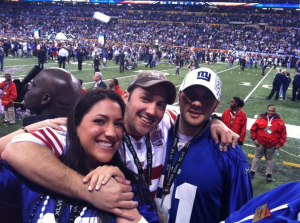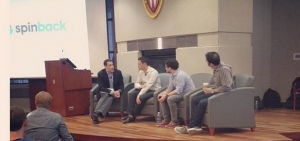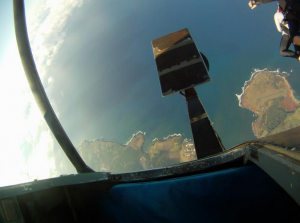This post originally appeared on Forbes.com.
Ian Monroe is a lecturer at Stanford University, as well as the founding CEO of Oroeco, a company that’s gamifying personal sustainability (and seeking to incentivize the global economy in the process). It’s a big mission and I was intrigued by what his company is working on so I caught up with Ian to hear more about Oroeco’s trials and tribulations, as well as his relocation to Santiago for Start-Up Chile.
Dan Reich: When and why did you decide to become a social entrepreneur?
Ian Monroe: Well, I suppose my path to social entrepreneurship was part inspiration, part imitation, and part process of elimination.
I’ve spent most of the last decade bouncing around the world while working on projects related to energy, sustainability, and international development. I enjoyed working with non-profits and corporate clients, but I didn’t see many lasting impacts come out of my field research and report writing. I also enjoyed collaborating with academics and government, but the lack of information transfer from research to policy-making and public awareness got similarly frustrating.
As these frustrations were building up, I saw many of my friends start companies I’m convinced are going to change the world, like Lukas Biewald (CrowdFlower), the late Corwin Hardham (Makani Power), and Brent Schulkin (Carrotmob). Being surrounded by entrepreneurship mentors – where I live in San Francisco’s Mission district there are literally dozens in every direction – made the process of founding a startup seem less daunting and more doable. All I needed at that point was an idea worth dedicating a substantial chunk of my life to build into a business.
DR: How did Oroeco become the idea you decided to build into a business?
IM: Oroeco was born out of seeing both need and opportunity. Fundamentally, Oroeco is something I’ve wanted for my own life for a long time. Despite being a supposed “expert” in sustainability – to the point that I’m invited to teach courses at Stanford on the topic, speak at conferences, and contribute to industry certification efforts – I still can’t walk into Walmart or a grocery store and easily quantify which options are best for other people and the planet. And the choices I know make a difference – like driving less and eating less red meat – are often offset by my international flights.
What I’ve been missing is a tool that easily tracks all my choices, shows me how they compare based on the metrics I care about, and suggests and encourages improvements. Ideally this tool would be fun and social too, since it’s easy to get overwhelmed by data, while comparisons to friends are a lot more engaging.
I also found myself increasingly thinking an Oroeco-like service was needed to realign our economy for sustainability. Most large-scale social and environmental issues – like climate change – trace back to companies producing goods and services that ultimately get paid for by consumers. So informed consumption can drive supply chains to become more sustainable, but first we all need the information and incentives to make better choices.
The idea for Oroeco didn’t refine into a social business concept until I saw that technologies already existed to make it happen. First my environmental life cycle assessment research with Stanford and NRDC exposed me to a bunch of great data sets, which quantify sustainability impacts for most products and services. Then I saw technologies like Mint.com make it easy to automatically track all my spending and investment in one place. And the last piece was seeing the opportunity to connect both of these data feeds to the growing ubiquity of Facebook and social gaming.
DR: What are the biggest challenges Oroeco has faced so far?
IM: The biggest initial challenge was building a great tech team. It’s funny, because I considered myself to be more of a “techie” than most with my science and engineering background, but unless you’ve got “computer” or “software” in front of your degree you don’t count as “technical” in the Silicon Valley.
Finding a team of solid technical co-founders took nearly a year. The process was made more difficult by the fact that Oroeco was entirely bootstrapping, so I was essentially only offering equity and enthusiasm for how Oroeco could change the world. On the positive side, we’ve now got a fantastic team that’s both highly qualified – most are startup vets from Stanford, MIT and UC Berkeley – and as passionate about personal sustainability and Oroeco as I am. I’m particularly excited that our primary engineering leads are two awesome women (Yang Ruan and Kirstin Cummings), which is a rarity in the startup world, and something that’s helping us incorporate gender-balanced perspective into design decisions.
DR: Chile is a long way to go for a startup accelerator, what convinced you to leave San Francisco for Santiago?
IM: We considered a few American startup accelerators, but by offering about $43,000 in equity-free investment, Start-Up Chile was by far the best deal we could find, as well as a great opportunity to connect with a network of international entrepreneurs who can eventually help Oroeco go global.
I’m the only Oroeco team member who’s spending a full six months in Santiago, while the rest of our team will keep circulating between the San Francisco area, Boston, and New York. While I’ve had the opportunity to work in much of the rest of Latin America on various sustainability projects, this is my first time in Chile.
On the more personal side, I’m fascinated by Start-Up Chile’s model, and getting a firsthand look at its successes and failures. The program is already being emulated by other countries, like Brazil. Start-Up Chile clones could catalyze entrepreneurship throughout the developing world, and the program is already sparking a tremendous amount of international networking and knowledge exchange.
DR: How has the Start-Up Chile experience compared to building a business in Silicon Valley? Has Chile succeeded in creating a startup-friendly environment?
IM: Overall, Start-Up Chile has been fantastic. The support staff and working environment are great. Santiago is an easy city to navigate, with public transportation on par with San Francisco and many European cities.
Navigating the Chilean bureaucracy has been a bit more challenging. Start-Up Chile has tried to streamline the process as much as possible, but there are still a lot of paperwork hoops to jump through. It took me nearly a month and more than a dozen signatures to open a bank account through a local Citi branch, then another half dozen documents to sign off on just to put cash into my account. In contrast, setting up a Citi account in San Francisco took about 15 minutes, and I’ve opened an account in Beijing in about as much time, despite my Mandarin being much worse than my Spanish!

DR: Oroeco’s mission is to fundamentally shift the global economy towards sustainability. But that task seems quite daunting, particularly for a little startup. What are your biggest challenges ahead?
IM: Our current challenge is to spread the word that we exist. Our big push now is to recruit our first beta users through our Indiegogo campaign – indiegogo.com/oroeco – which wraps up January 1st. So if people hear about us, like what we’re doing, and want to try us out, that’s the place to go. We’ve got a next to nil marketing budget, so we’re relying heavily on social marketing and word of mouth.
Over the longer term, the challenge is to simultaneously grow our user base while keeping our existing users engaged. There’s plenty of market research that shows most people want to live more sustainable lifestyles, and Oroeco can be a disruptive technology that changes how people and companies incorporate sustainability into decision-making. But for that to happen we need to scale to millions of users, ideally hundreds of millions, and these users need to be engaged enough by Oroeco’s user experience that our information and incentives factor into their everyday choices.
Our success will ultimately hinge on our user experience, since a compelling product will market itself. We think we’ll appeal to more users as we add societal, health and environmental impacts indicators beyond climate change, and we should appeal to even more users as we refine our social gaming and rewards. The challenge is to add functionality without compromising on design elegance, and to provide a flexible interface that can accommodate a wide range of user preferences.
A final challenge is protecting user privacy, particularly since we’re working with financial transaction data that can be sensitive. It’s important users trust us with their information, and have faith that we won’t create a great service that changes the rules of the privacy game once it hits critical mass. Users understandably get quite upset when this happens, which we’ve seen most recently with Instagram.
DR: Any parting advice for aspiring social entrepreneurs?
IM: It’s cliché to say, but the most important thing is to be thoroughly passionate about what you’re working on. And don’t be afraid to share that passion with everyone you know. Your honest enthusiasm is what will attract like-minded team members, as well as investors and users. It’s also ultimately what will make the bouncy startup journey fun and rewarding, even if you end up in a ditch.
I’m naturally a pretty laidback guy, with a tendency to engage in long-winded academic discourse, so infectiously exuding my excitement for Oroeco is a challenge. But I’m still happily working long nights and waking up excited, which is only the case because I still thoroughly believe we’re building something that will help craft a sustainable future. Sharing this passion with a great team and crew of awesome advisors has only magnified this feeling. Now we just need to demonstrate there are a lot of users out there who feel the same way.
Dan Reich is a tech entrepreneur and engineer. He has founded and sold multiple companies, the most recent of which was acquired by Buddy Media, which in turn was acquired by Salesforce. Follow him on Twitter at @DanReich.





 (Istanbul, Turkey)
(Istanbul, Turkey)


